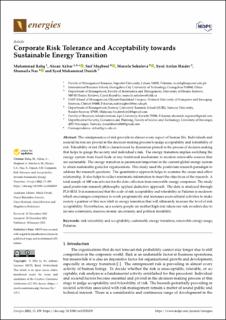| dc.contributor.author | Rafiq, Muhammad | |
| dc.contributor.author | Akbar, Ahsan | |
| dc.contributor.author | Maqbool, Saif | |
| dc.contributor.author | Sokolová, Marcela | |
| dc.contributor.author | Haider, Syed Arslan | |
| dc.contributor.author | Naz, Shumaila | |
| dc.contributor.author | Danish, Syed Muhammad | |
| dc.date.accessioned | 2023-03-15T11:31:32Z | |
| dc.date.available | 2023-03-15T11:31:32Z | |
| dc.date.created | 2022-05-10T08:57:18Z | |
| dc.date.issued | 2022 | |
| dc.identifier.citation | Rafiq M, Akbar A, Maqbool S, Sokolová M, Haider SA, Naz S, Danish SM. Corporate Risk Tolerance and Acceptability towards Sustainable Energy Transition. Energies. 2022; 15(2):459. | en_US |
| dc.identifier.issn | 1996-1073 | |
| dc.identifier.uri | https://hdl.handle.net/11250/3058357 | |
| dc.description.abstract | The omnipresence of risk prevails in almost every aspect of human life. Individuals and societal factors are pivotal in the decision-making process to judge acceptability and tolerability of risk. Tolerability of risk (ToR) is characterized by dynamism pinned in the process of decision making that helps to gauge the society and individual’s risk. The energy transition implies switching the energy system from fossil fuels or any traditional mechanism to modern renewable sources that are sustainable. The energy transition is paramount important in the current global energy system to attain sustainable goals for organizations. This study used the positivism research paradigm to address the research questions. The quantitative approach helps to examine the cause-and-effect relationship. It also helps to collect systematic information to meet the objectives of the research. A total sample of 300 was selected for the data collection from renewable energy companies. The study used positivism research philosophy applied deductive approach. The data is analyzed through PLS-SEM. It is summarized that the scale of risk acceptability and tolerability in Pakistan is moderate which encourages companies to work progressively and increases sociocultural activities to make society a partner of this new shift in energy transition that will ultimately increase the level of risk acceptability. Nevertheless, as a society, people are neither high-risk takers nor risk avoiders due to income constraints, macroeconomic uncertainty, and political instability. | en_US |
| dc.language.iso | eng | en_US |
| dc.publisher | MDPI | en_US |
| dc.rights | Navngivelse 4.0 Internasjonal | * |
| dc.rights.uri | http://creativecommons.org/licenses/by/4.0/deed.no | * |
| dc.title | Corporate Risk Tolerance and Acceptability towards Sustainable Energy Transition | en_US |
| dc.type | Peer reviewed | en_US |
| dc.type | Journal article | en_US |
| dc.description.version | publishedVersion | en_US |
| dc.rights.holder | the authors | en_US |
| dc.subject.nsi | VDP::Teknologi: 500::Miljøteknologi: 610 | en_US |
| dc.source.volume | 15 | en_US |
| dc.source.journal | Energies | en_US |
| dc.source.issue | 2 | en_US |
| dc.identifier.doi | 10.3390/en15020459 | |
| dc.identifier.cristin | 2022916 | |
| dc.source.articlenumber | 459 | en_US |
| cristin.ispublished | true | |
| cristin.fulltext | original | |
| cristin.qualitycode | 1 | |

